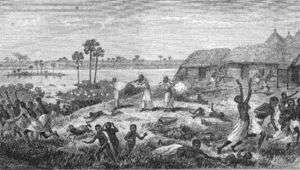Slave raiding
Slave raiding is a military raid for the purpose of capturing people and bringing them from the raid area to serve as slaves. Sometimes seen as a normal part of warfare, it is nowadays widely considered a crime. Slave raiding has occurred since antiquity. Some of the earliest surviving written records of slave raiding come from Sumer (in present-day Iraq).

The act of slave raiding involves an organized and concerted attack on a settlement with the purpose of taking the areas' people. The collected new slaves are often kept in some form of slave pen or depot. From there, the slave takers will transport them to a distant place by means such as a slave ship or camel caravan. When conquered people are enslaved and remain in their place, it is not raiding.
Slave raiding was a violent method of economic development where a resource shortage was addressed with the acquisition by force of the desired resource, in this case human labor. Other than the element of slavery being present, such violent seizure of a resource does not differ from similar raids to gain food or any other desired commodity.
Slave raiding was a large and lucrative trade on the coasts of Africa, in ancient Europe, Mesoamerica and in medieval Asia. The Crimean-Nogai raids into East Slavic lands provided some two or three million slaves to the Ottoman Empire over the course of four centuries. The Ottoman corsairs from the 16th century onwards through 1830 engaged in razzias in Africa and the European coastal areas as far away as Iceland, capturing slaves for the Muslim slavery market in North Africa and the Middle East. The Atlantic slave trade was predicated on European countries endorsing and supporting slave raiding between African tribes to supply the workforce of agricultural plantations in the Americas.
Spanish slave raiding in Chile
Albeit there was a general ban of slavery of indigenous people by Spanish Crown the 1598–1604 Mapuche uprising that ended with the Destruction of the Seven Cities made the Spanish in 1608 declare slavery legal for those Mapuches caught in war.[1] Mapuches "rebels" were considered Christian apostates and could therefore be enslaved according to the church teachings of the day.[2] In reality these legal changes only formalized Mapuche slavery that was already occurring at the time, with captured Mapuches being treated as property in the way that they were bought and sold among the Spanish. Legalisation made Spanish slave raiding increasingly common in the Arauco War.[1] Mapuche slaves were exported north to places such as La Serena and Lima.[3] The Mapuche uprising of 1655 had parts of its background in the slave hunting expeditions of Juan de Salazar, including his failed 1654 expedition.[4][5] Slavery for Mapuches "caught in war" was abolished in 1683 after decades of legal attempts by the Spanish Crown to suppress it.[3]
See also
- Abduction
- Bride kidnapping
- Blackbirding
- Crimean-Nogai raids into East Slavic lands
- Turkish Abductions
- Shanghaiing
References
- Valenzuela Márquez 2009, p. 231–233
- Foerster 1993, p. 21.
- Valenzuela Márquez 2009, pp. 234–236
- Barros Arana 2000, p. 348.
- Barros Arana 2000, p. 349.
Bibliography
- Barros Arana, Diego. Historia general de Chile (in Spanish). Tomo cuarto (Digital edition based on the second edition of 2000 ed.). Alicante: Biblioteca Virtual Miguel de Cervantes.
- Foerster, Rolf (1993). Introducción a la religiosidad mapuche (in Spanish). Editorial Universitaria.
- Valenzuela Márquez, Jaime (2009). "Esclavos mapuches. Para una historia del secuestro y deportación de indígenas en la colonia". In Gaune, Rafael; Lara, Martín (eds.). Historias de racismo y discriminación en Chile (in Spanish).
